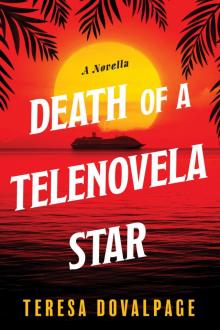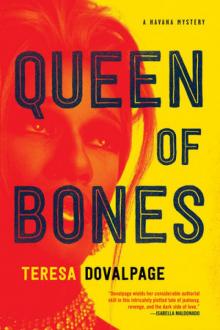- Home
- Teresa Dovalpage
Death of a Telenovela Star (A Novella)
Death of a Telenovela Star (A Novella) Read online
Also by Teresa Dovalpage
Death Comes in through the Kitchen
Queen of Bones
Copyright © 2020 by Teresa Dovalpage
The original version of this story was first published in
The Taos News, a community newspaper in Taos, NM.
All rights reserved.
Published by Soho Press, Inc.
227 W 17th Street
New York, NY 10011
This is a work of fiction. Names, characters, places, and incidents either are the product of the author’s imagination or are used fictitiously, and any resemblance to actual persons, living or dead, businesses, companies, events, or locales is entirely coincidental.
Library of Congress Cataloging-in-Publication Data
Dovalpage, Teresa, author.
Death of a telenovela star / Teresa Dovalpage.
ISBN 978-1-64129-185-9
eISBN 978-1-64129-186-6
Subjects: GSAFD: Mystery fiction.
PS3604.O936 D45 2020 813’.6—dc23 2019051717
Interior design by Janine Agro
Printed in the United States of America
10 9 8 7 6 5 4 3 2 1
To Staci Matlock, muchas gracias for your encouragement!
1: Shenanigans
Aboard the North Star were five thousand travelers and one open bar. What could be expected from such a crowd but shenanigans? That’s what Marlene Martínez thought as she looked around her with suspicion. With so many passengers crammed onto the one-thousand-foot boat, something bad was bound to happen.
Her grandfather, bless his soul, used to say, “Somewhere, something bad is happening to somebody right now.” Years ago, Marlene had laughed at his unabashed pessimism, but now, watching from her lounge chair the noisy throng waiting by the pool for their cabins to be ready, she couldn’t avoid a sense of dread.
Something bad is going to happen to somebody on this ship.
It was the first cruise Marlene had ever taken. A short one, just seven days’ roundtrip from Miami to Belize, Costa Maya and Cozumel. Though she had initially booked the trip on impulse for her niece, Sarita, as a quinceañera present, she’d found herself anticipating a fun, relaxing vacation. But there was something in the air. A hint of danger that, as a former detective, Marlene knew too well.
Sarita was celebrating her fifteenth birthday that month, and the only thing she wanted was to get away from “Culo del Mundo.” She lived in Albuquerque, a city that Marlene agreed was the rear end of the world. Sarita screamed and hugged her aunt when she heard about her present, saying a Caribbean cruise sounded “sick.”
The trip was also a reward for Sarita, who had stayed out of trouble after a rough start that year, a shoplifting incident at the Coronado mall and what her father—Marlene’s brother—called “the pot problemita.” She had been caught smoking dope in the schoolyard with her best friends, Lupe and Jane, and all three of the girls had been suspended for two weeks and sent to a counselor. “The others were the instigators,” her father told Marlene. “It was peer pressure.” But the girls were all careful to stay on their best behavior afterwards. They started an online newspaper for their journalism class and ran articles about Latino nights at The Cooperage—a popular Albuquerque steakhouse—hiking the La Luz trail in the Sandia Mountains, and the state’s incentives for the film industry in New Mexico.
Sarita loved being a reporter so much, she’d taken a two-month internship at the Albuquerque Journal. She deserved a reward, and Marlene was happy to provide one. But just in case, Sarita’s mother had cautioned her sister-in-law to keep the girl on a short leash for the duration of the cruise.
That wouldn’t be easy, though. Just before boarding, Marlene had found out that Carloalberto, a part-time model and aspiring actor from Cuba who went by only his first name, was among the passengers. It wasn’t uncommon to find celebrities on these short Caribbean cruises, particularly when those celebrities were C-listers, as Carloalberto happened to be. Besides starring in several telenovelas, he had been made almost famous by his appearance on The Terrific Two, a TV program that featured actor-screenwriter pairs competitively pitching their movie ideas to Hollywood producers. The winning team would receive enough funding for their proposed project. They were down to the last round, and Carloalberto and his partner, a screenwriter named Helen Hall, were among the three teams left.
Marlene had never heard of them. Her Miami bakery, La Bakería Cubana, kept her too busy to watch much TV. But Sarita hadn’t stopped talking about Carloalberto since she’d arrived in Miami. She even showed Marlene headshots of him that she for some reason had on her phone, so her aunt couldn’t quite ignore his presence. He was tanned and tall, in his early twenties with gym-rat muscles, a chiseled jaw and what Sarita described as “a kissable mouth.”
And here he was, a few feet from Marlene. She looked for her niece, but the girl wasn’t around, so she allowed herself time to admire the man—just for fun, of course. He was far too young to take seriously, and Marlene hadn’t yet recovered from her last love affair, which had ended quite poorly—though she supposed it could have been much worse. Still, she could admit that Carloalberto was a handsome specimen, although there was something alarmingly familiar about him. What was it?
He was talking to an older blond man in a Hawaiian shirt. After exchanging a few words, the two of them walked behind the pool bar where a frazzled bartender chain-served mojitos and daiquiris. They seemed to want to hide from the fray. Marlene watched their mouths. In her time on the Cuban police force, she had learned to read lips. It helped that their conversation was in Spanish.
“I don’t have it yet,” Carloalberto said, his well-defined jaw shaking. “You’ll have to wait until the show is over.”
“How do we know you’re going to win?” the other replied. “There’s no guarantee those Hollywood pendejos don’t get rid of you tomorrow.”
“They won’t. I promise! As a finalist, I practically have that money secured.”
“Practically won’t cut it.”
“Please, be patient. I’ve always come through before, haven’t I?”
“Yes, but now you’re late. I’m not a patient man.”
“Look, I had a source of income that’s . . . no longer available. But I have money coming my way. Please, just give me a month.”
The man eyed him carefully.
“You get a week,” he said through clenched teeth. “One. If you don’t come up with something by the time the cruise ends, you’re in trouble. Got it?”
Carloalberto nodded. His perfect tan looked slightly paler. Mr. Hawaiian Shirt left. Carloalberto stayed motionless, staring at the Miami lights shimmering along the coastline as the boat sailed out to sea.
Marlene had been so focused on the exchange that she didn’t realize Sarita was there until the girl grabbed her arm.
“Did you see him, Tía?” She pointed to Carloalberto. “That’s the one I’ve been telling you about! Isn’t he the most beautiful papichuli in the world? I can’t believe we’re going to spend a whole week on the same boat as him! Do you think he’ll notice me?”
“I hope not, mijita.”
Sarita whipped out her smartphone, which had a pink case covered in glitter. She punched in a number and started talking a mile a minute. It surprised Marlene. Her niece seldom used her phone to make calls—only to text and send WhatsApp messages.
Shenanigans are brewing, thought Marlene.
2: Sundown at Sea
The ship was traveling at around twenty knots, or twenty
-three miles, per hour, the cruise channel informed passengers. The Miami coastline was no longer visible. The casino and the onboard boutiques, which had been closed while in port, opened their doors and welcomed the herd of passengers that rushed to them right away.
Marlene and Sarita’s stateroom was located on deck fourteen, mid-ship. The girl let out a happy cry when she saw it.
“Aww, Tía, I didn’t expect it to be so nice!”
The cabin had two sofa beds, a dresser, an armchair and a spacious closet with enough room for their luggage. Marlene had packed a pair of jeans, a few shorts and T-shirts, one formal just-in-case outfit and a bathing suit, but Sarita carried in her two backpacks dresses, shirts, skirts, bikinis and tankinis; in sum, more clothes than days the cruise was going to last.
The cabin had generally been designed to make the most of minimal space, but also had a few nice touches, like prints of tropical birds and butterflies in blue metal frames on the walls and a pretty glass carafe and two cups on a silver tray over the minibar.
The shower had a translucent frosted glass door. North Star–branded cotton bathrobes and slippers sat nearby on a lacquered shelf.
“On fleek,” Sarita concluded.
Marlene hoped that meant she liked it.
A round table and two green mesh chairs furnished the balcony. The stateroom was a deck above the lifeboats, which Marlene appreciated, since they would have obstructed a stunning ocean view.
After unpacking, they went out and spent the next fifteen minutes deciding where to eat. It shouldn’t have been a difficult choice, considering that the two main dining rooms, dubbed
“Delicious” and “Scrumptious,” served exactly the same menu. There was also a buffet spot, The Forest Café, but it was crowded.
Marlene suggested Delicious, which was on deck seven and had a ten-minute wait time according to the electronic sign above its door. But when Sarita spotted Carloalberto outside The Ambassador—a specialty restaurant with a fifteen-dollar surcharge per person for entrance—she insisted on eating there despite its having triple the wait time. After some back and forth, Marlene relented, though it meant they had to go back to the cabin and change—the restaurant had a dress code. Truthfully, though, she was still intrigued by the earlier exchange between the aspiring actor and the blond in the Hawaiian shirt.
When they entered the restaurant, Sarita wowed softly at the flowing red curtains and gold-plated mirrors. A small art gallery of Impressionist paintings covered one wall. Their tuxedoed waiter led them to a white-clothed table for two and promptly brought over bread in a silver basket—warm rolls, focaccia and garlic knots. Marlene was presented with an encyclopedic wine list but ordered a modest Zinfandel. Italian music played in the background.
“This is Verdi’s La Traviata,” Sarita said.
“Really?” Marlene asked, surprised. “How do you know?”
“When I was interning at the Journal, the editor I was working with did a feature on the Santa Fe Opera,” the girl explained with a self-satisfied look. “They even gave us free tickets. I learned a ton about classical music there.”
“Well, I’m proud of you!”
Carloalberto was sitting by himself at a table for four, dressed in a dark blue suit and tie. Formality forgotten, Sarita retrieved her cell phone and entered a password. Marlene was looking at her niece’s manicured nails, painted a bright green, and noticed that she had typed in a series of 2s to unlock her phone. Coño, could the girl not have chosen a more secure passcode? Sarita started snapping pictures of the actor as discreetly as she could, which was not very discreetly. He didn’t seem to notice, or maybe he was used to it.
“I can’t wait to send these to Jane and Lupe!” Sarita said. “And post them on Instagram for all my ABQ friends. They’ll be so jealous!”
Marlene made her stop. Sarita was practically about to throw a tantrum, but when a tall, well-dressed woman joined Carloalberto, the girl shut up immediately. The woman was a stunning leggy brunette with green eyes.
“That’s his wife, Emma,” Sarita said in a reverent tone. “She’s a model, half-Venezuelan and half-Italian. She’s so skinny and beautiful! Ah, I wish I looked like her, but I’m saddled with this big butt.” Sarita sulked.
Marlene wanted to lecture her on self-esteem and body image, but what good would it do? Besides, most teenagers had image issues and outgrew them along with acne.
They ate quietly. Sarita kept eyeing the couple and sighing. Carloalberto and his wife didn’t talk much either. The model, as Sarita pointed out, looked annoyed.
For dessert, Marlene ordered Baked Alaska. She was enjoying the pairing of vanilla ice cream and warm meringue when Sarita jumped in her chair. Another woman had showed up at the couple’s table.
“This ship is chock-full of celebrities!” the girl whispered. “Do you know who she is?”
Marlene glanced at the newcomer. She was thirty-something, slightly chubby, with brown hair and a mousy expression.
“No idea,” she answered, turning her attention to the sponge cake.
“Helen, his screenwriting partner on the show! I think she has a crush on Carloalberto. But I mean, who doesn’t? Look how she’s kissing him!”
It certainly wasn’t the usual cheek-to-cheek air kiss. Hers was lingering, longer than Latino social greeting protocol dictated. The model didn’t say a word as Carloalberto and Helen chatted away.
“Ese huevo quiere sal,” said Marlene.
“What eggs, Tía? What needs salt?”
“It’s what you say when somebody is coming onto someone else,” Marlene explained.
“Of course Helen’s into him, but she has no chance,” Sarita said. “She’s so average-looking, or even below that next to Emma!”
After dinner, Sarita followed Carloalberto and the two women to the casino on the same deck. Marlene grudgingly followed, not daring to leave her niece alone for one second with these troublesome celebrities.
“Isn’t there enough to do on this ship for you not to stalk these people?” she grumbled.
“I’m not stalking anybody. I’m just walking around! I’ve never been inside a casino before.”
To Marlene’s surprise, many of the slot machines were already taken.
“How silly, to pay this much just to park yourself in front of a screen,” she said.
More serious players had gathered around a craps table, Carloalberto and Helen among them. The guy in the Hawaiian shirt sauntered around, stopping here and there to observe a round or test out a slot machine. But he always kept an eye on the actor, who seemed well aware of his presence. His hands shook whenever he took a chip from the tall stack before him. Not far from there, Emma was absorbed in a baccarat game.
Marlene left Sarita circling Carloalberto—there were other teenage girls doing the same—and visited the closest boutique. She bought a straw hat since she had forgotten to pack hers, a yellow tunic dress with the North Star logo, and a bottle of suntan lotion. Then she took the elevator to leave her purchases in the cabin before picking Sarita up. They had tickets for the Blue Man Group that night.
The elevator door opened. Carloalberto was inside, admiring his reflection in the mirrored side panel in a way that Marlene found gag-worthy. At close range, he was less handsome. His eyes were small, beady and too close together, and his forehead unnaturally smooth and shiny, revealing a recent encounter with Botox. He got off on deck twelve.
Once in her stateroom, Marlene placed her purchases in the closet and her wallet in the safety box. She had brought a few La Bakería Cubana business cards. She didn’t anticipate needing them there, but you never know when a new investor or chef might wander by. This bakery was her most ambitious undertaking, inspired by sampling far too many mediocre offerings in town, and she was determined to make it big.
A splendid sundown ignited the horizon in red and orange hues. Marlene
walked to the balcony, and a salty mist enveloped her like a lace scarf. Other passengers were also outside enjoying the view, but not all were interested in the beauty of nature. There was a couple making out on the balcony diagonally below theirs. The man was Carloalberto, and the woman was his plain-looking screenwriter.
Wait till I tell Sarita, Marlene thought. Sometimes being beautiful isn’t enough.
But hadn’t Carloalberto left the elevator on deck twelve? That meant he should have been two decks below, not one.
Suddenly, he pushed his partner away and hurried inside the cabin. Marlene wondered if Emma had walked in. She hoped so.
3: A Duplex in Bacuranao
“Men cause more trouble than they are worth,” Marlene whispered to herself as the memory resurged.
It was the day her life fell apart, scattering tender pieces of her heart in every direction. In the ocean mist, she saw Yoel the painter. The beach bum. The hijoeputa she could have killed when she found out.
Marlene and Yoel had been together only seven months, but she had fallen hard. He had moved in with her after her mother’s death—a vulnerable moment in her life, she realized too late. He had been pleading with her to do a permuta, a house swap, from downtown Havana where they lived to Bacuranao.
“Your house is too old and decrepit to be converted to a casa particular,” he told her. “But it’s big enough to be traded in for a smaller, newer place on the beach.”
Marlene didn’t like hearing her late mother’s home being called old and decrepit, but she reluctantly admitted that it had seen better days. The walls were peeling, and the electrical wiring had become a nightmare. The walls hadn’t been painted in over thirty years. The tiles in the smoke-stained kitchen were beyond repair. The cast-iron stove, built in the early thirties, stood precariously on four bricks. A lot of money, which they didn’t have, and skilled labor would be necessary to make the place livable again. And what use did they have for four rooms, anyway?

 Death of a Telenovela Star (A Novella)
Death of a Telenovela Star (A Novella) Queen of Bones
Queen of Bones Death Comes in Through the Kitchen
Death Comes in Through the Kitchen